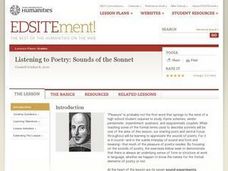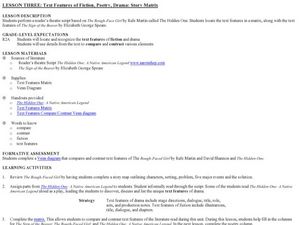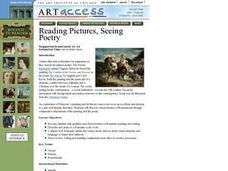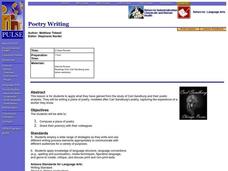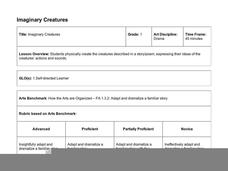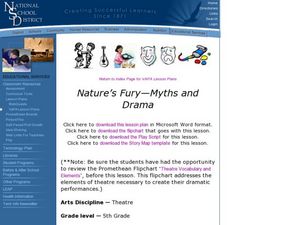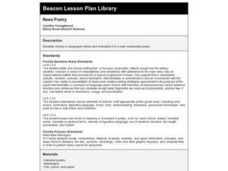Curated OER
Collective Poetry: Teaching Tolerance
Help your class create collective poetry following a simple, engaging model from Teaching Tolerance (tolerance.org). Each young poet writes five things on an index card: sayings from others, favorite sound, favorite place, favorite...
National Center for Families Learning
The Summer Fun Summer Learning Poetry Unit
Focus on poetry this summer to enhance those comprehension, fluency, and language skills with a set of resources intended to explore different types of poetry, specifically lyric poetry. The daily activities contain differentiation ideas...
Curated OER
Listening to Poetry: Sounds of the Sonnet
Learners investigate how sound influences meaning in poetry by listening to sonnets. They write an analysis after listening to and reading sonnets.
Prestwick House
Poe’s “The Raven” – Unity of Effect
How do Poe's choices of imagery, rhythm and rhyme scheme, and structure help build the desired single effect of "The Raven"? After listening to a dramatic reading of the poem, class members consider whether Poe's choices do create a...
Curated OER
Text Features of Fiction, Poetry, Drama: Story Matrix
How do novels differ from plays? Explore with your class the text features of fiction and drama by reading The Hidden One: Native American Legend and then performing a reader’s theater script based on the story. Class members create a...
Curated OER
The Element of Color
Eighth graders study and analyze the elements of color by creating an personalized color wheel. Emphasis is placed on constructive criticism of student work by others for assessment. Students create short poems for their color wheel...
Curated OER
Reading Pictures, Seeing Poetry
Learners examine the painting, The Combat of the Giaour and Hassan based on a poem by Lord Byron. They compare how Romantic artists and writers made choices about visual elements and language to depict their subjects.
Alabama Learning Exchange
J. Alfred Hyperbolizes
Mermaids will sing to your class members as they engage in an activity related to T.S. Eliot's famous dramatic interior monologue. After engaging in a socratic seminar about literary devices in the poem, individuals choose one...
Curated OER
Dusty Locks and the Three Bears
Read this twist on Goldilocks and the Three Bears: Dusty Locks and the Three Bears by Susan Lowell. Kindergartners listen, predict, and discuss the story. They then participate in a dramatization of the story and draw a picture to...
Curated OER
Epic Poetry: Literary Terms for Story Analysis
What do Star Wars, Indiana Jones, and The Odyssey have in common? Why, they are all epics, of course, and are presented here as examples of the literary term. If you are beginning a study of epics, consider previewing the terms included...
Orlando Shakes
Native Gardens: Study Guide
A study guide for Native Gardens, a dramatic play, introduces theater lovers to a set of a neighbors and the problems they face. Discussion questions in the guide tackle themes of racism, ageism, and classism.
Curated OER
Poetry-The Essence of Life
Students analyze and appreciate various types of poetry. In this poetry unit, students read classic and contemporary works to discover ways in which poetry expresses strong feelings. Students identify key vocabulary used to analyze...
Annenberg Foundation
Gothic Undercurrents
Terror, mystery, excitement. American writers of the 19th century, including Nathaniel Hawthorne, Herman Melville, and Emily Dickinson, used these elements to create morally ambiguous tales that challenged the prevailing belief in...
Curated OER
Emily Dickinson Poetry
Young scholars identify a poem by Emily Dickinson for analysis. They apply a set of critical questions to a poem in order to interpret poem and find literary elements used by author. They organize information for a PowerPoint...
Curated OER
Poetry Writing
Students compose a piece of poetry modeled after the poetry of Carl Sandburg and share their poem(s) with their colleagues. They use a cluster diagram to organize their thoughts and brainstorm their ideas.
Curated OER
Identifying Text Features of a Self-Written Fable
Make learning the parts of a book fun by having pupils construct their own glossary entries, table of contents, and title page. Beginning with a review of text features and a hunt for examples, kids use previously written fables to...
Curated OER
Working with Shakespeare, the Poet and Dramatist
Students study the work of William Shakespeare. They survey the elements of comedy and tragedy and read plays and poems. They discuss the texts they read and recite poetry. They dramatize poems with movement and sounds and write poetry...
Curated OER
In the Poet's Shoes: Performing Poetry and Building Meaning
Middle schoolers explore poetry by completing a webquest in which they hear poets reading their own work. Later, they examine the dramatic impact of reading poetry out loud. Finally, they practice reading poetry aloud and performing.
Curated OER
Literature: War-Themed Poetry and Drama
Eleventh graders examine Arthur Miller's play, "All My Sons" to discover major dramatic elements. After reading several war-themed poems, they connect the concepts presented in them back to a major character in Miller's play. ...
Hawaiʻi State Department of Education
Imaginary Creatures
Drama and movement are wonderful ways to cover story elements such as setting, character, and descriptive writing. Little ones listen to a poem about imaginary creatures. As they listen, they shape their bodies into what they think the...
Curated OER
Analyzing Literary Devices
Eighth graders identify figurative language and poetry in this literary analysis lesson. Using Through the Looking Glass by Lewis Carroll and a YouTube video for "The Walrus and the Carpenter," young readers complete a literary device...
Curated OER
Nature’s Fury—Myths and Drama
Fifth graders explore the elements of theatre. In this dramatic performances lesson plan, 5th graders discuss the structural elements of theatre and dramatize "The Origins of the Season," an explanation myth.
Curated OER
News Poetry
Third graders select a small item in a newspaper and then dramatize it in a well-constructed poem. They share their poems with the class.
Curated OER
Identifying and Describing Story Elements
First graders examine how to identify the different elements of a story and how they fit in a definite sequence. The use of comprehension skills is essential to retell the story as desired within the lesson.




